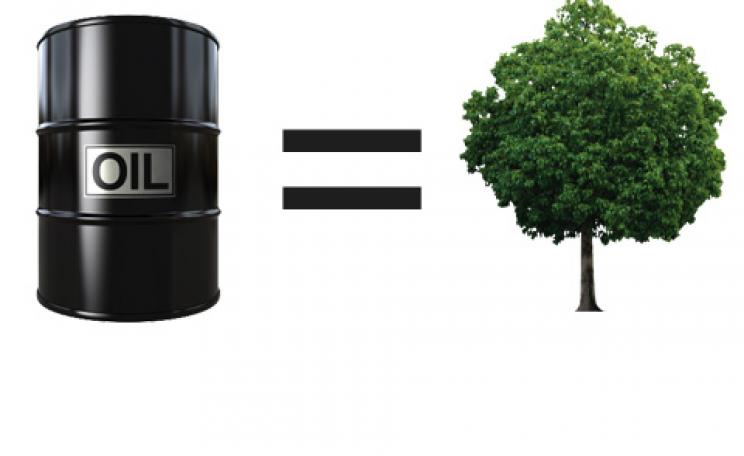The following is an abridged version from Polly Higgins speech, Why We Need a Universal Declaration of Planetary Rights, given on the 6th November 2008 in Belfast at the United Nations (UK and Northern Ireland) Climate Change Conference.
This planet we call Earth is no longer a place of honour. We have depleted fossil fuel reserves, we have created escalating emissions, we have polluted, poisoned, damaged, destroyed, and caused the extinction of numerous species.
Trees
Without trees we wouldn’t be here. Trees provide us with wood for us to build, paper to write on as well as a source to burn for heat. They protect both us and the soil from the sun and the rain. They cool the air in hot dry weather by the transpiration of water vapour into the atmosphere. Their roots take water and nutrients from the soil and help bind the soil together on hills and mountain-slopes. Most importantly, they act as carbon sinks and manufacture oxygen: counterbalancing global warming. Even in death they enrich the soil.
In November 2008 scientific findings were published, establishing that the release of the chemical Terpene from tree canopies leads to cloud formation that cools the climate. Given the ancient forests' massive canopies, these findings serve to underline and reinforce the critical role of trees and wilderness in maintaining a viable atmosphere. (1)
Logging continues on an unprecedented scale and rate, destroying the lungs of the planet. At the polar opposite end of the scale, let me give you an example closer to home. In the past five years, London councils have chopped down almost 40,000 street trees, including some more than 100 years old. Some were aged, diseased or dying, but 40 per cent were removed because of insurance claims. Healthy mature trees are being felled by risk-averse insurers and councils because of the suspicion that they may affect neighbouring properties with subsidence, or fall on people. Yet a report commissioned by the London Assembly said that only one per cent of tree-removals were justified. It found that, despite the key role they play in combating climate change and creating pleasant environments (the report's own words), Britain’s urban trees are under threat. Only 11 per cent of trees in towns are now between 50 and 100 years old, the survey discovered; only two per cent are more than 100 years old. That means: when they get big, they get chopped down. (2)
Tree rights
But trees remain largely unprotected; they do not have rights. We accord rights to abstract entities such as corporations, churches, universities, councils, governments – yet, unlike trees or any plant matter they are intangible. They are abstract concepts that we, humans have created. We have created the legal rights for a corporation to stake its claim on a piece of land, call it property and then use or abuse that land in whichever manner it sees fit.
The entities that exist on that land - the trees, the birds, the water, the fish - have no rights at all. But a corporation is not tangible in the way a tree is. It is an artificial concept that we have created for our benefit. It is a fiction, but it has standing in court. The tree, the river, the deer does not.
Rights of others in history
When one provides a thing with rights, an ethical relationship is automatically created. But if that thing remains merely property – property for the use of humans - then no rights exist.
Until very recently there was a long history of women in matrimony in the UK being considered as chattels to a marriage. It was not until 1991 that it was determined by the House of Lords that matrimonial rape was a reality, and that the husband could no longer rely on the rule of law that a wife, by dint of marriage alone, was deemed to have consented irrevocably to sexual intercourse with her husband. (3)
In UK childcare proceedings a child has recognisable rights. That child is unable to formulate its own sophisticated representation on the issues to be determined, but he or she can be represented in court by what is called a Guardian ad Litem who speaks on his/her behalf and can have legal proceedings instituted on their behalf to protect their welfare.
Likewise the tree cannot exercise rights. But if rights were to be accorded to them, individuals or groups should be able to apply to the court for legal guardianship, and for the right to litigate on behalf of the natural object.
What rights?
Christopher Stone in his seminal article ‘Should Trees Have Standing?’ argued that natural objects should have at least three basic rights: the right to institute legal action at their own behest; the right to have injuries to them taken into account in determining legal relief; and the right to benefit from that relief.
This is common sense – it is simply the recognition of an existing reality and the creation of a framework to express our ethical relationship with nature. Imagine the day when we have here in the UK an Earth Rights Act. After all, we have a Human Rights Act. Like the Childrens Act, it will be one that stipulates that the overriding objective is the well-being of the planet. Think how that would change how we approach business (oil companies!), how we determine our choice of energy supplies, how it would shape our transport policies…
This is not radical. Ecuador voted for a new Constitution on Sunday 28th September which recognises legally enforceable Rights of Nature, or ecosystem rights. Ecuador is the first country in the world to codify a new system of environmental protection based on rights.
Article 1 of the new "Rights for Nature" chapter of the Ecuador constitution reads: 'Nature or Pachamama, where life is reproduced and exists, has the right to exist, persist, maintain and regenerate its vital cycles, structure, functions and its processes in evolution. Every person, people, community or nationality, will be able to demand the recognitions of rights for nature before the public bodies.'
Why a Universal Declaration of Planetary Rights?
Time is short, the solutions are there, but they need to be implemented swiftly. Mere technology is one solution - it is a tool, although a very useful tool. But more is required. We need to protect this beautiful planet, and to ensure that such protectionism is effective and global in application. For that we need the use and support of laws. Much as a voluntary code is useful and even desirable, we know from past experience that leaving corporations to implement their own voluntary codes in reality achieves little of true substance.
A Universal Declaration of Planetary Rights is of course not the end of the matter, it is the first step. Just as the Universal Declaration of Human Rights has not given us a perfect world where all live in harmony without torture, freedom of speech and assembly, neither would a Universal Declaration of Planetary Rights provide an instant fix.
A Universal Declaration provides the initial tools, as with Human Rights, for a foundation upon which they can be implemented into national legislation. These are the tools that provide instruction and education to resolve the conflicts that come thereafter.
In practical terms a Universal Declaration of Planetary Rights would also provide the mechanism and the machinery to correct and address the errant and selfish human behaviour towards the environment.
We have to halt the irreversible loss, damage and destruction of this planet if we are to become sustainable for future generations. A Universal Declaration of Planetary Rights can do that. The United Nations are uniquely positioned to make this happen. Like a mighty tree, a Universal Declaration of Planetary Rights would provide the strong roots to secure the future growth of a solid trunk of rights. Out of this trunk would sprout the equally strong branches representing the implementation of national legislation. This is our opportunity to put in place the foundations for a better future of the planet.
Trees Have Rights Too was created to promote and build a campaign for a Universal Declaration of Planetary Rights. Find out more here.
The full speech can be read here
Polly Higgins is a barrister and environmentalist. She works closely with TREC-UK, a network of scientists and engineers advancing the concept of building concentrating solar power (CSP) plants in the desert and is a UK Associate for EnAct International, a consultancy that specialises in developing and strengthening governance systems that promote ecologically sustainable societies. Polly also blogs on all things environmental under the name of The Lazy Environmentalist, and is the founder of WISE: Women in Sustainability and the Environment – an international network that brings together women who are working on sustainability issues and the environment.
Footnotes
(1) Royal Society journal, Philosophical Transactions, Published 03/11/08
(2) The Independent, 25/04/08, Green Giants: Our Love Affair with Trees
(3) R v R [1992] 1 A.C. 599, House of Lords
This article first appeared in the Ecologist December 2008






